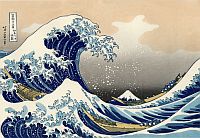- Home
- Science
- Research Groups
- Research Topics
- Annual Report
- Education
- Agenda
- Public & Media

- Contact Us
de Géophysique (Bât. B5c)
Quartier Agora
Allée du 6 août, 19C
B-4000 Liège 1 (Sart-Tilman)
Belgique
Tel.: 04.366.9779
Fax: 04.366.9729
Research Topics
Oceans

The global ocean, which covers 70% of the surface of our planet, is an
essential regulator of the climate. The oceans host a rich ecosystem which
sustains significant fishery resources. Moreover, the oceans absorb about
30% of the total carbon dioxide (CO2) emissions; they thus contribute
to limit the climatic changes associated with the green house effect.
However a strong anthropogenic pressure is applied on this environment.
Nearly half the human population lives at less than 100 km from the coasts,
leading to various perturbations of the marine environment: modification of
the coastline, introduction of several pollutants (heavy metals, nutrients,
organic matter, ...). CO2 emissions resulting from human activities
also cause an acidification of the oceanic water, with the risk of jeopardize
some of the marine species.
The marine environment study requires to master several disciplines: physics, chemistry, biology, geology, etc. This is why teams and research projects are most of the time interdisciplinary. Several groups of the departments concentrate their efforts on the ocean study by implementing both experimental efforts and modelling or data processing tools.
Thereby the researchers at GHER and LPAP model the water mass circulation as well as its influence on the carbon flux through marine systems, the exchanges of sediments with the ocean floor, and the impact on the global climate. Carbon fluxes within ecosystems have an impact on the transfer of CO2 between oceans and atmosphere. These transfers are the object of in situ surveys lead by the UOC. Joint projects are lead by several groups. For instance in Calvi (Corsica), where the University has the STARESO station at its disposal, physicists from the GHER compute the currents and the mixing of water mass using on-site measured meteorological data. At the same time, continuous observations of oxygen, performed by the UOC, allows the quantification of primary production in order to validate ecosystem models.
The different teams of the AGO work on a set of marine systems such as estuaries, mangroves, the North Sea, the Mediterranean and the Black Sea, the upwelling systems (rise of water), the polar seas (Southern and Arctic Oceans), the sea ice, the marine sediments, and the global ocean.



 Version française
Version française